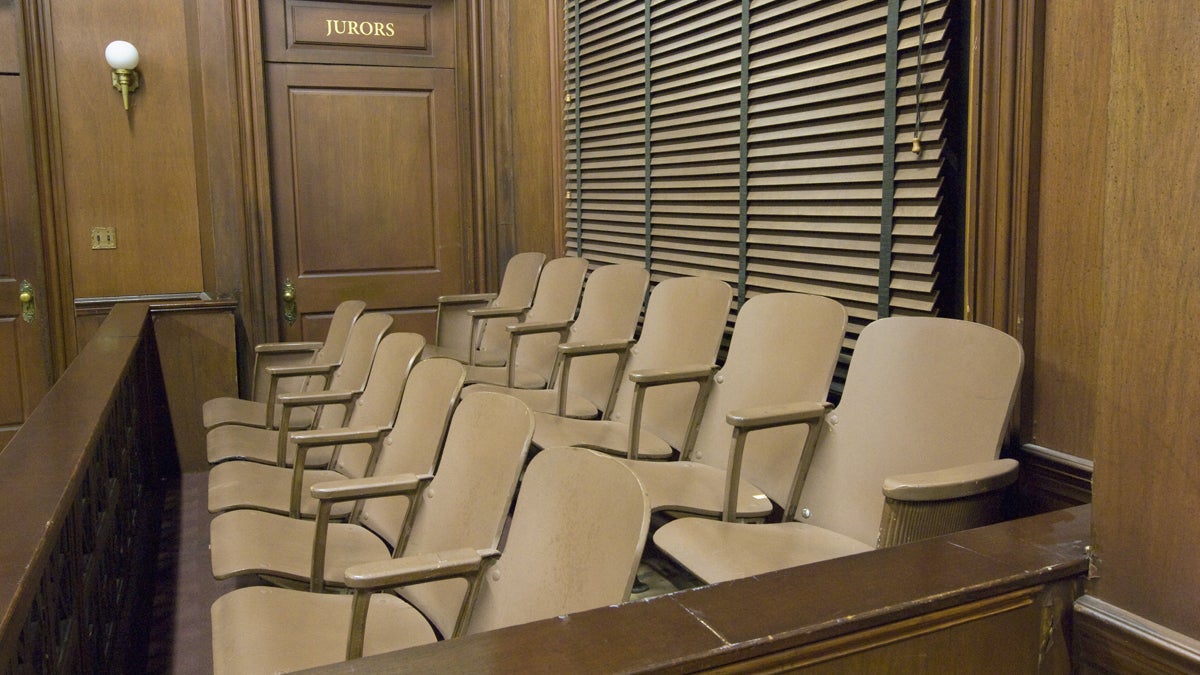Welcome to Philadelphia jury duty, a test of impartiality

(Jury box image courtesy of Shutterstock.com)
The other day I received a summons. Yup, I had jury duty. I was prepared. I brought a good book, a big bottle of water and my trusty iPad. … And thus began my somewhat surprising journey through the Jury Questionnaire.
The other day I received a summons. Yup, I had jury duty. I was prepared. I brought a good book, a big bottle of water and my trusty iPad. I hoped I’d be in a room with wifi so I could work or, better yet, surf the net in search of cool furniture (a mild obsession).
In the five or so times I’d been called for jury duty in Delaware County, where I used to live, I never had to contemplate my suitability as a jurist. Only once did I even see the inside of the courtroom — briefly. Turns out, there had been a plea bargain, so we were all dismissed. So for the most part, I read. And in the early stages of the day in Philadelphia, the drill looked remarkably the same.
After getting our juror numbers, we were ushered into a small room where a court official struggled to get a DVD to play. She turned the player on and off. Someone else came in and turned it on and off. Several potential jurors offered suggestions. Eventually, the disc played — and thus began my somewhat surprising journey through the Jury Questionnaire.
Answering honestly
I quickly realized there were some nuances I had not considered. For example:
Do you have any moral, religious or ethical beliefs that would prevent you from sitting in judgment in a criminal case and rendering a fair verdict?
Given the fact that I had no idea what the potential case was about, I didn’t know how to answer that question. Obviously, I should say no, but what if it involved something I felt passionately about, like child abuse? I didn’t really think I could be fair to someone who had been accused of hurting a child.
And then there was this question:
Would you be less likely to believe the testimony of a police officer or law enforcement officer because of his or her job?
Again, the answer should be no, but … come on, people. I’ve seen “Serpico.” I remember The Five Squad. Even today in New York City, criminal convictions are being undone following the unmasking of Detective Michael Dowd, leader of the so-called “Losers Club,” a band of dirty cops engaged in illegal drug shakedowns.
Eventually, we made it through the form, and I answered the rest of the questions the best I could. (For the record, I would not be less likely to believe a policeman’s testimony just because of his job.) When it came time to discuss my answers with the judge, I figured the conversation would be pretty straightforward. After some brief small talk, he honed in the one question I definitely knew the answer to:
Have you or anyone close to you ever been a victim of violent crime?
The myth of impartiality
In college, my best friend was raped at knife point. She told me she thought she had survived because her Quaker instincts kicked in. She actually asked the guy what she could do to help. I was grateful that he hadn’t killed her, though he did take away a big chunk of her life.
A few years later, my apartment was robbed, my car stolen and I was mugged at gunpoint. That, too, took away a chunk of my life.
These events happened more than 30 years ago. And while I hadn’t forgotten about them, they don’t rule my life the way they once did. So when the judge asked me whether I could set aside those personal experiences to render an impartial judgment, “yes” seemed like the right answer, but as it turned out, that’s not what I said. To my surprise, what came out of my mouth was “I hope so.”
At that moment, I suddenly realized that I didn’t know whether I could be impartial to anybody — commonwealth or the defendant. I had my history. The defendant had his. We make judgments based on what we’ve experienced. He was arrested carrying a loaded, unlicensed gun. I hate guns, unlicensed or otherwise.
If I had said yes, I’m sure the judge would have assumed I was lying. He would have been right. So instead, I said I hoped so, because I did.
I can’t erase the terror I felt when I was held up at gunpoint in the foyer of my apartment building. No more than I un-remember stories of police corruption or gang violence or terrible child abuse. That’s just part of the bits and bytes that make us human. I was going to bring all that into the courtroom whether or not I said yes.
I hope so meant I would do my best though that, apparently, wasn’t good enough. I was dismissed from jury duty (along with a nun, go figure). I see the logic, of course, and although I wasn’t terribly sorry (I did have a good book), it did leave me wondering what it meant to be impartial.
Did it mean we were expected to leave our experiences and history at the door? Is that even possible? After all, we all have our prejudices. And until I actually sit on jury panel, I can’t answer the question about whether my experiences will outweigh my desire, my hope, to be fair.
WHYY is your source for fact-based, in-depth journalism and information. As a nonprofit organization, we rely on financial support from readers like you. Please give today.

